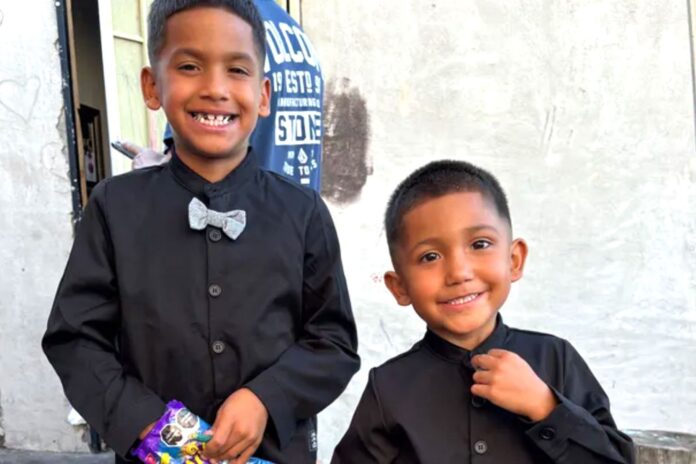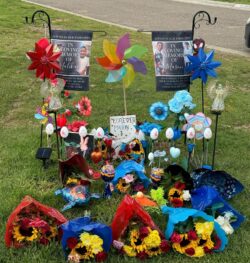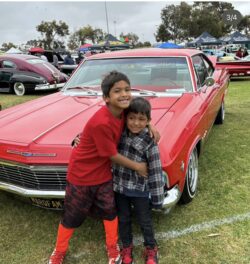
“If the police followed the rules of the pursuit, those two little boys would still be here.”
By Macy Meinhardt, Voice & Viewpoint Staff Writer
Tasha Willamson’s words on behalf of a Mother who lost her children in an alleged botched police chase last year pierced the room Wednesday night, as community members gathered to discuss the dangerous impacts police pursuits hold to the public at large.
On the evening of December 8, 2023 an unlicensed driver, going approximately 100 mph while fleeing police, slammed into the back of their family friend’s Honda vehicle in Mountain View, killing Victoria Orozco-Romero’s two young sons sitting in the back, 4 year-old Mason and 8 year-old Malikai Orozco-Romero.
It is reported that the suspect, 20-year-old Angel Daniel Velasquez-Salgado, was signaled to pull over for speeding and driving with his lights off. Instead of yielding to officers, Velasquez-Salgado sped off, resulting in a chase that spanned about 5 miles on surface streets and two freeways, reaching up to 100 mph in speed.
The chase was halted at the 43rd street off-ramp where Velasquez-Salgado reared into the families car, sending it off an embankment and into a tree where it burst into flames. Along with the Mother Victoria, the boys’ nanny was also in the car, where she was transported to a nearby hospital for injuries. Velasquez-Salgado allegedly fled the scene and took off some clothes to conceal his identity, prosecutors allege. He was later arrested a few blocks away. The two boys died on the way to the hospital and Velasquez-Salgado pleaded not-guilty to two murder charges.
Although Velasquez-Salgado awaits trial and years of potential jail time for his actions, advocates for the Orozco-Romero family also believe the San Diego Police Department should be held accountable, claiming that the unnamed officers acted “recklessly” and did not follow SDPD pursuit policy that states: “Officers should not assume that all persons who flee from police and refuse to yield are serious criminal suspects. Frequently, termination of a pursuit in the interests of safety is most appropriate.”
In addition, the Orozco-Romero family was not the first vehicle to be hit during the pursuit, before hitting the family Velasquez-Salgado also rear-ended an elderly woman’s vehicle while police officers chased him. Advocates say officers were given the chance to end the pursuit right then and there, as it clearly demonstrated evidence of endangering the public.
Across the United States, from 2017 through 2022, police pursuits killed 3,336 people, more than 25% of those individuals were bystanders, according to a national investigation performed by The San Francisco Chronicle.
The report additionally notes that the vast majority of pursuits are initiated over traffic violations, not serious felonies; as was in the case with Velasquez-Salgado. Moreso, “it appears that communities of color take the biggest hit. According to the SF Chronicle staff, police chases kill four times as many Black people per capita as white people and Latinos die at a rate 50% higher than whites.”
The lives of 8-year old Malikai and 4-year old Mason Orozco-Romero painfully add to the statistic that averages two deaths per day from police pursuits, according to investigation findings. Adding to the loss, the mother Victoria sustained significant injuries, and has since undergone multiple surgeries and remains in a wheelchair.
Malikai was described as a sweet little boy who loved school, “he would never want to miss a day,” his family says. He had a lot of friends at Porter Elementary and he one day dreamed of being a Doctor to help his mom who suffers from lupus.
“Mason looked up to his brother, he always wanted to be doing what Malikai was doing, and he loved to eat. He would eat anything,” the family writes of their other son.
“The resulting figures are still likely undercounts, as not every chase is the subject of a news story or lawsuit,” the Chronicle states.
However, locally, the legacy of Malikai and Mason is also serving as a catalyst to a much larger conversation that aims to relook at the San Diego Police Departments pursuit policy.
Within San Diego, from 2017 to 2023, Voice & Viewpoint analyzed over 24 different police chases that led to 33 citizen deaths. Not every report listed what started the chase, but eleven of the ones reported were over non-criminal offenses. Just days after the deadly Dec. 8 police chase, another young citizen, 18 year-old Shevondia Bell was also killed in a Escondido Police Department chase following a suspected retail crime.
“It’s amazing how the police think petty crime justifies death,” one Twitter (x) user, Agnes May, wrote in response to Bell’s death.

“Misdemeanor cases, citation cases, costing lives? This is what we are seeing, and we have a policy that enables this kind of behavior, via immunity, ” said Yusef Miller, with North County Equity and Justice Coalition.
SDPD Pursuit Policy at a Glance
The current pursuit policies that SDPD are charged to follow, and the question on whether or not those policies were adhered to on the night of Dec. 8, took the center of discussion last Wednesday during a community hearing held by the the City’s Commission on Police Practices.
SDPD was invited to share their policy themselves with the public and listen to victim testimony but declined upon legal counsel. Instead, the policy was outlined by CPP outside Counsel Duane Bennett.
According to SDPD’s pursuit policy, it states, “the decision to initiate a pursuit should take into account the need to protect the public and balance the known or suspected offense and the apparent need to immediately capture the suspect against the risks to peace officers, innocent motorists, and others.”
Further adding to the controversy over pursuit policy, is a statute that immunizes departments that engage in police pursuits, regardless of whether or not there is injury, damage, or death—California Vehicle Code 17004.7.
The vehicle code outlines that in order for immunity to be granted there must be existing procedures in a pursuit policy that determines how pursuits are handled. However, so long as the department has the policy in place, “the immunity applies whether or not an officer follows policy or not.”
Therefore, when the injured parties are innocent bystanders, liability is particularly difficult to elude.
“We know police officers have immunity, but there is liability when you kill people,” said Willamson.
Furthermore, Andrea St. Julian, who works closely with the commission, highlighted how the liability clause serves as the main purpose for the policy, and recommended that the commission hire a policy expert to make changes that actually addresses safety for the public; not just liability for the officers.
“I would strongly urge you to find some of the very best policy experts on pursuits, hire them as consultants, and go through this policy with a fine tooth comb to figure out what the best practices are and how this policy can be changed so this never happens again,” said Julian.
Therefore, the meeting on March 6 served as the first step towards implementing possible changes in the future over the policy, noting that it is not something “that will happen overnight.” Commissioners agreed that at the next Police Practices meeting on March 20th, a discussion will be agendized to work out the logistics of hiring a policy expert.
SDPD did not respond to Voice & Viewpoint for comment.
“I will not let them forget about you boys. The world is going to know who you boys are and I will forever tell your story, #justiceformalikaiandmason,” a family member writes in a Tik-Tok memorial video posted





